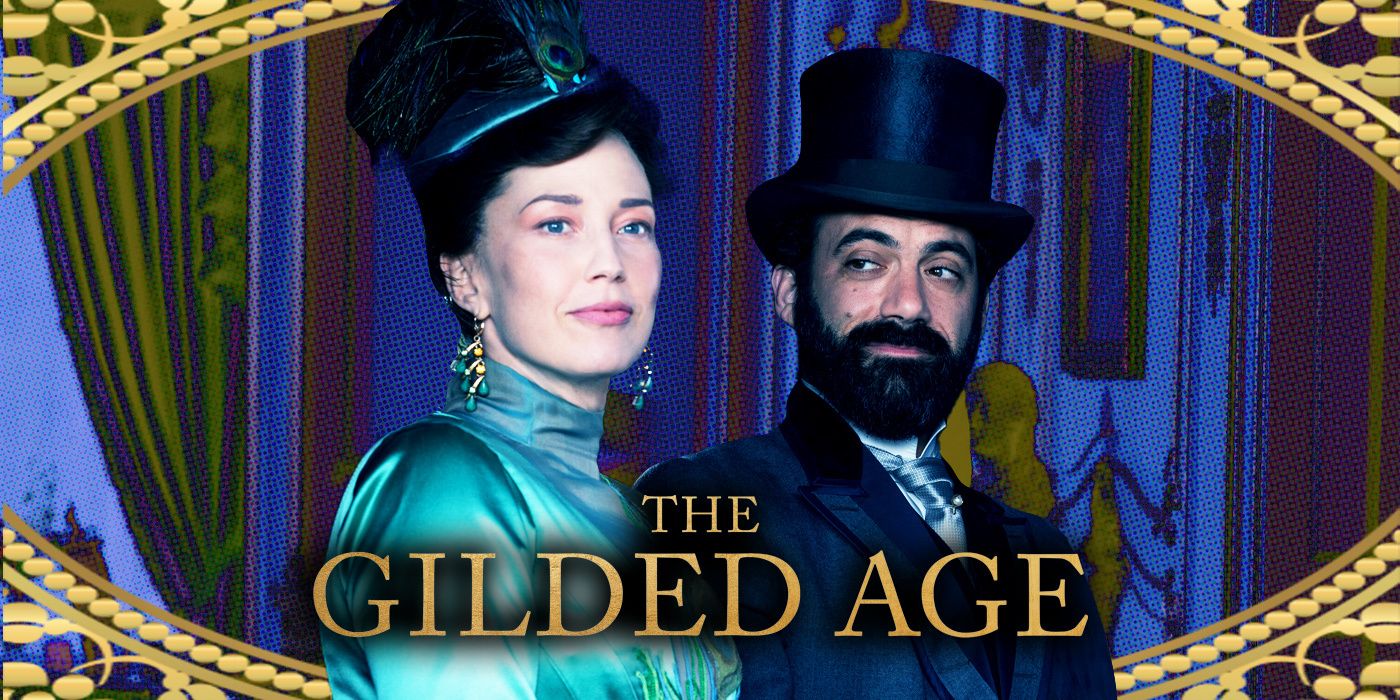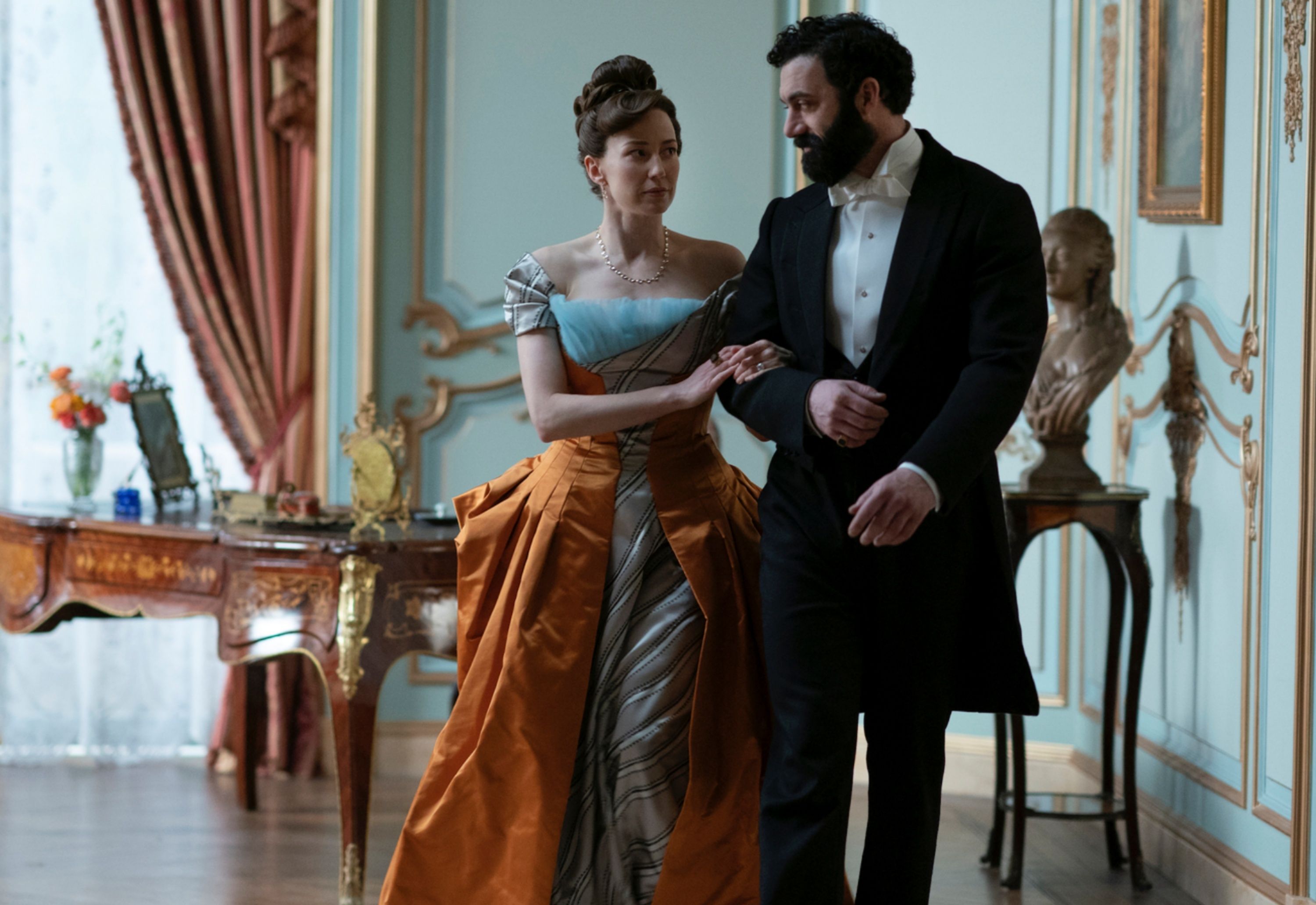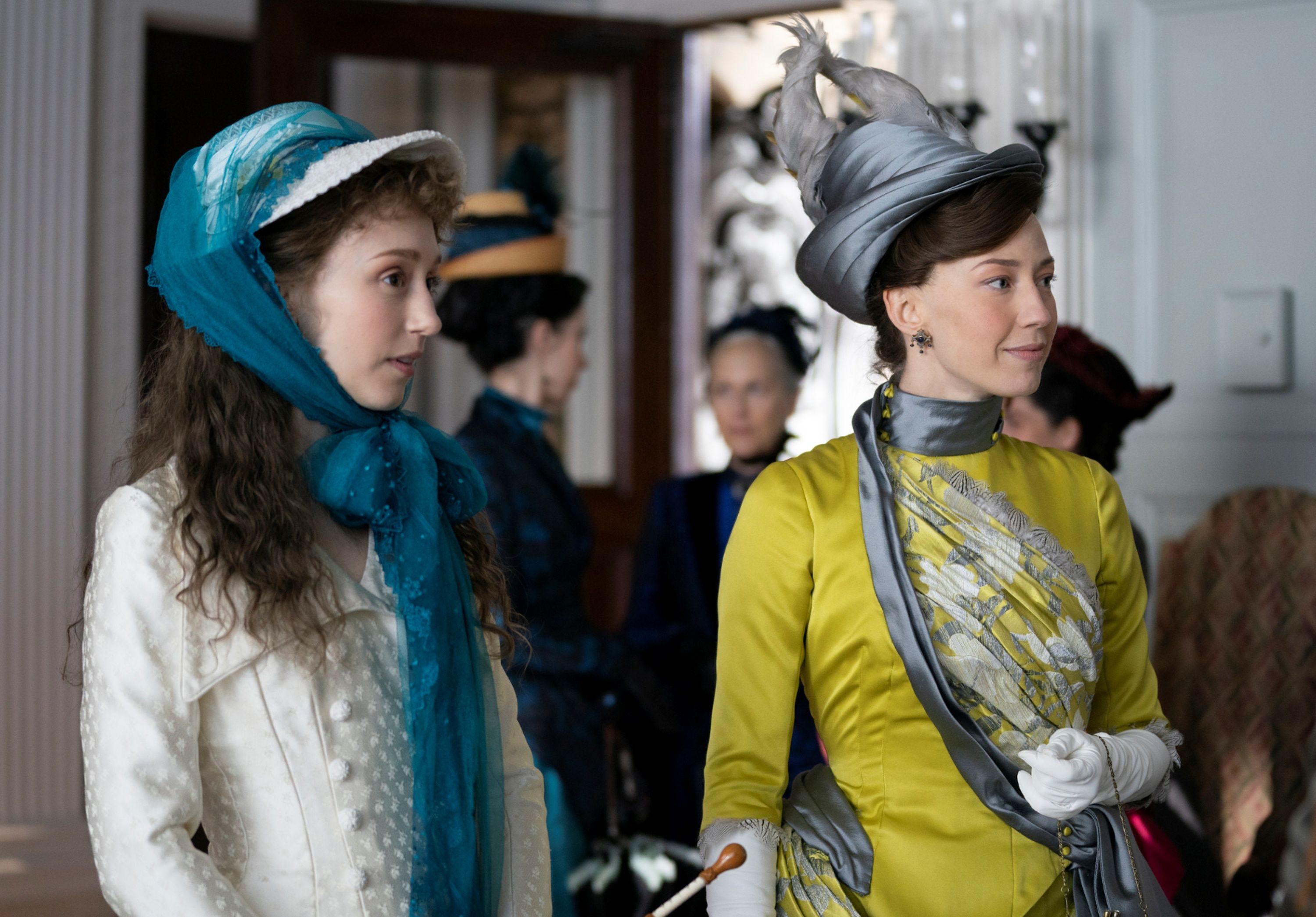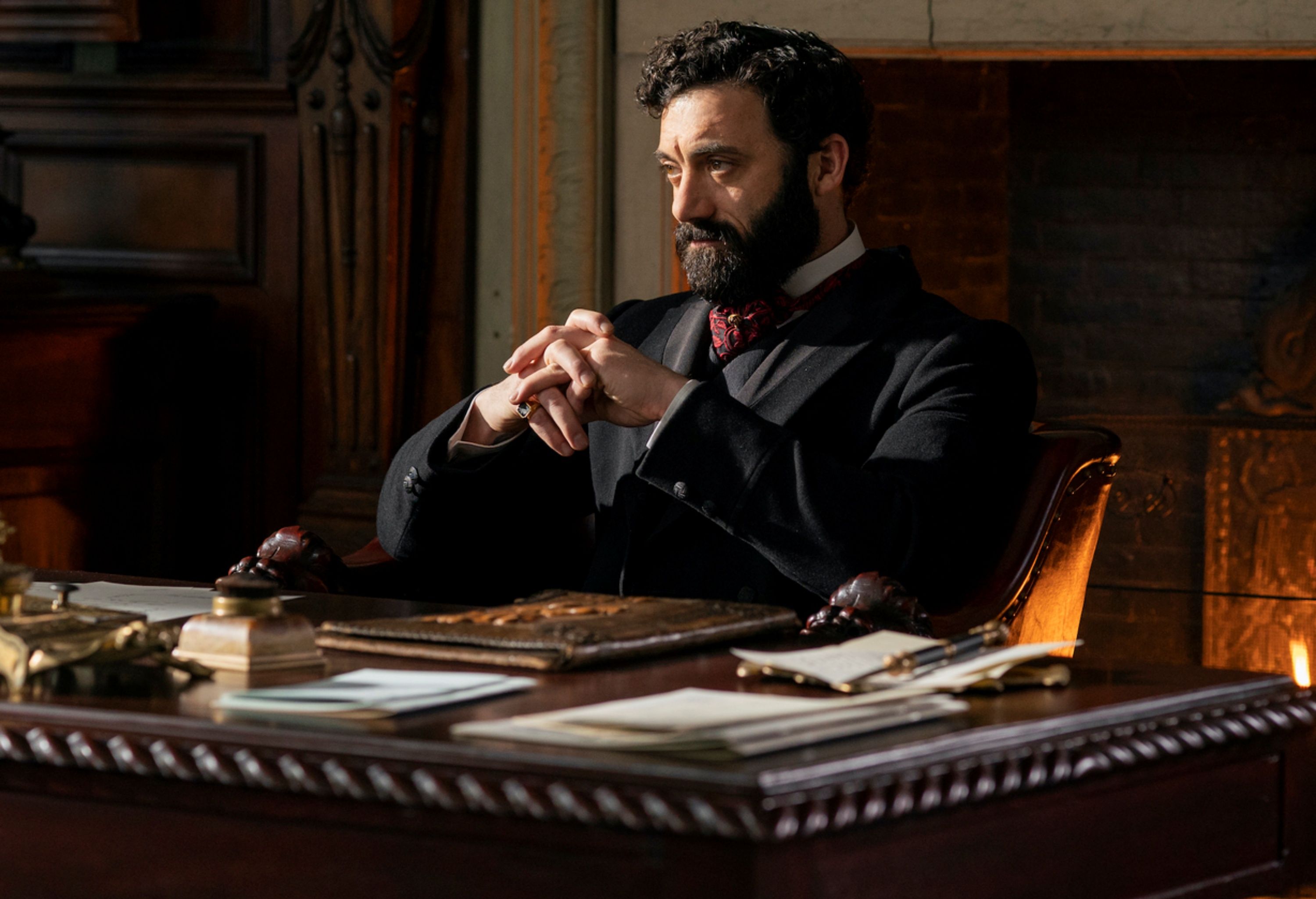Co-written by show creator Julian Fellowes (Downton Abbey) and Sonja Warfield, the HBO drama series The Gilded Age is set in the lavishly extravagant world of late 19th century New York and finds the orphaned Marian Brook (Louisa Jacobson) moving into the home of her aunts, Agnes van Rhijn (Christine Baranski) and Ada Brook (Cynthia Nixon). Once there, the young woman quickly learns the importance of whether you come from old money or new and that there are certain expectations for her that she might not be fully willing to follow, as she finds her place in society.
During a virtual junket for the new show, co-stars Carrie Coon (who plays Bertha, the Russell matriarch determined to use her wealth and position to break into a society that is not welcoming to new money) and Morgan Spector (who plays George Russell, a robber baron that has acquired millions through his ruthless business practices) spoke to Collider about the partnership of their characters’ relationship, how the dynamic was all on the pages of the scripts, the challenges of the period costumes, how nerve wracking it can be as an actor to drop into a new character’s life, and the fun of working with Nathan Lane.
Collider: One of the things that really struck me about your characters is their communication and how well they know each other. They feel like two people who love each other and have lifted each other up, but who actually also talk about what they want for their life and family. What do you enjoy about exploring that kind of relationship dynamic? Did it feel as much like a partnership and that they were a forced to be reckoned with while you were playing them?
CARRIE COON: It’s on the page.
MORGAN SPECTOR: That’s true. I associate some of this kind of writing with the restraint of these people’s lives. There’s this lack of communication. They don’t say the important thing, or they’re too proud, but these people are a little bit more rough and tumble with each other, so they’re able to really say the thing that needs to be said to one another. I love it. It’s a portrait of a marriage that works. These are not perfect people. It’s not a perfect relationship, but it is perfect for them, in that it allows them both to flourish, as they should. It allows them both to be fully themselves. A relationship like that is rare, actually. It’s rare in writing. It’s fun to play.
COON: It’s much harder to write a good marriage than it is to write a bad one because in a bad one, the conflict is inherent. In this, the conflict is about two people who are fighting for each other, which is a dynamic that’s familiar to me, in the marriages that work and in the people that I know. It felt very familiar and very grounded and real. And of course, to have a woman in this time have her ambition respected is very unusual. That’s much more interesting to play than the buttoned up version that Morgan was speaking about.
These characters also walk a very fine line because they’re not outright villains, but they’re the villains to the people of New York that are very set in their ways and don’t want to deal with these new people. And yet somehow they’re also still sympathetic because we do see who they are with each other when they’re at home. Was there anything that you guys specifically wanted to bring to their personal dynamic that wasn’t necessarily on the page, but that you thought might help find that balance?
COON: Oh, that’s interesting. It’s so replete on the page. I really do think the dynamics you’re observing are in place, so it was our job to get out of the way, and to take on the clothes and the accent and the hats, and really live in that. That was really the challenge of it. The actual dynamics are already in place in the scripts. I credit Julian [Fellowes] with that and also Sonja Warfield, our other writer. I just feel like three-quarters of the work is done for you, when you walk onto that set in those clothes. All you can do is screw it up. For myself, I have that dynamic in my own life, and Morgan and I both have kids. We know, at the end of the day, whatever decision we make is gonna be what’s best for our kids. It may not be the best thing for the world. If we’re all honest with ourselves, we’re all making calculations like that every day. So, I find them so relatable.
SPECTOR: Absolutely. I have my kid in a private preschool. I basically think private schools should be abolished, but I still made that decision for myself. We are all struggle in those ways. One thing about Julian’s writing, and I think I’ve discovered this from talking to other actors across the board on our show, is that it really just invites you to be fully yourself. The more you can do that, despite the accent and the costumes, and the more you can reveal your own character in his work, I think the better his work is served. It’s been a really fascinating thing to discover about this show, in particular. I hear us both talking about our own marriages and how much they’ve informed what we’re doing. Maybe it’s all casting, in the end.
Carrie, what’s it like to spend so much time in these costumes, to get fitted for all of them, and to physically move around, sit in and function in them? How much does that influence what you’re doing?
COON: There are many hats where I had to say, “Can you put the top down in the carriage please?,” because my head was to the side. That happened more than once. They’re extraordinary. They absolutely remake your body and restrict your body. They’re a real challenge in stamina. These women didn’t wear their costumes for 17 hours at a clip. They changed five or six times a day, and you start to understand why. I think I had 25 dresses for the first four or five episodes. It was an extraordinary number and a tremendous amount of work. And of course, I also had the added challenge of getting really pregnant about a quarter of the way in. Everything they made, we just had to throw out and start over. Not really. What they ended up doing was putting a lot of strings in the back and a lot of elastic and moving buttons. The costume department managed to mask my pregnancy for most of the shoot, so they had to do very little CGI, ultimately. They did it all with actual practical costuming. I had to remember what it was like to move around in a corset because I didn’t have one anymore. That was actually, in some ways, more challenging because the corset is a cheat. You can’t slouch in the corset, but once it’s gone, I had to keep pretending like I had one on. In some ways, that was harder. And wearing high heels when you’re pregnant was not my favorite thing. It’s miserable.
You’ve both been in this business for quite a while and you’ve both played characters that you’ve gotten to live in for a bit, but when you start a new project, especially something like this that is so massively epic, do you get nervous? Are there always nerves on the first day?
SPECTOR: Yeah. That first scene that we shot...
COON: We just want to reshoot it.
SPECTOR: I don’t think we need it reshot. I think it’s fine. But that first scene was our introductory scene and it was a scene I really knew well. It had been one of the audition scenes, and sometimes that can be a problem. You know a scene too well and you’ve grooved it in, and then you get in the space to really do it and you’re like, “That’s not how I wanna do it.” Day one is always nerve wracking because you’re walking into the middle of someone’s life. You’re never starting on the day that the person was born. Usually, you’re walking into the middle of a fully formed human being’s day. It’s not quite as easy as it will be.
COON: And there are a hundred people in PPE looking at you, hoping you do a good job so we can finish on time.
SPECTOR: They’re just like, “I wanna go to lunch. My face mask has been on for 17 hours.”
COON: Yeah, these people can’t drink water or have snacks on set because they’re trying to keep us safe, and they did. You feel a sense of responsibility to your community to do a good job, so you can all go home.
SPECTOR: But I will say, despite that, yes, I was nervous, but we were doing it together and I always felt like we’d be okay. That did make it a lot easier.
Carrie, I love the scenes that you have with Nathan Lane because it’s this moment of fun that we get to see. What was it like to get to explore that dynamic and to have a little bit of play, after having her have to be buttoned up so much and not be able to fully express what she’s feeling?
COON: It is a delight when Bertha gets something that she wants. I love those moments of release that she gets, so I’m glad that you pointed those out because they are really fun. They’re fun for me because they’re fun for her. And of course, speaking of walking into a room fully formed, who else would you can in that part, but Nathan Lane. In some ways, it was intimidating, in the way that he would’ve been for an Alva Vanderbilt, as the gatekeeper to society. Nathan Lane is really the gatekeeper to the theatrical world, in New York anyway. In some ways, the parallels already existed. There are so many Tony Awards represented in the cast. There are so many theater actors there. And so many of the actors on the show have worked together. Kelli O’Hara and Nathan and Christine [Baranski] all have long histories together. It’s really fun to see those dynamics inform those character relationships, when you’re in the room with those people. That makes it so much more fun. We laughed a lot. There are a lot of dirty jokes when Nathan was around.
The Gilded Age airs on Monday nights on HBO and is available to stream at HBO Max.




